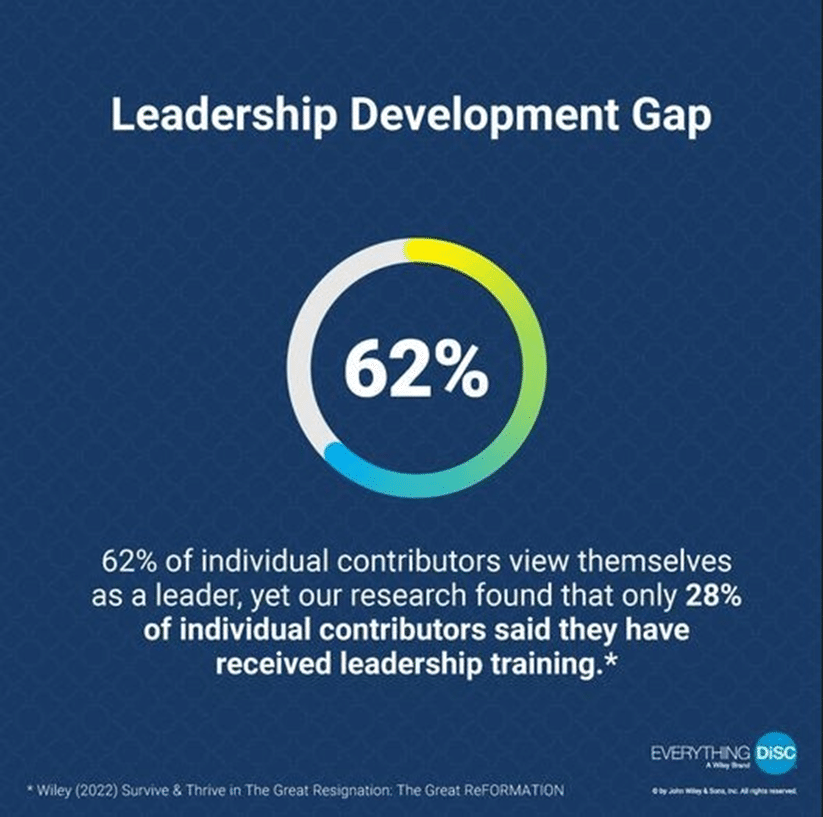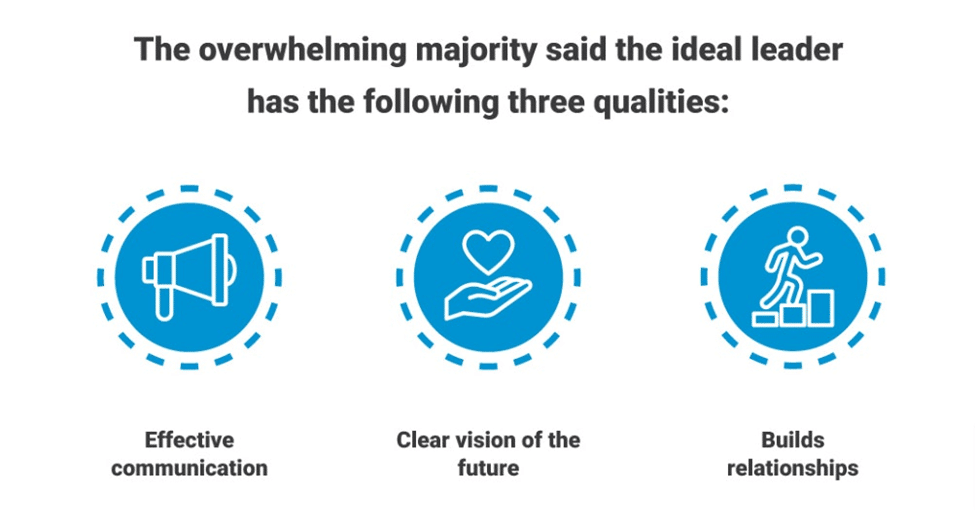
Leadership skills and development
We often look for leadership by focusing on charisma and confidence combined with a stellar résumé or academic credentials. What does define great leadership?
A recent survey by Wiley found that perspectives are shifting about how leadership is viewed. It’s much more people-focused and collaborative than authoritative or charismatic. It’s less about position and more about relationships and accountability.
DiSC® leadership styles
Everything DiSC® has identified eight dimensions of leadership. What type of leader are you? What can you learn from other styles of leadership?
Leadership is not a person or a position. It is a complex moral relationship between people based on trust, obligation, commitment, emotion, and a shared vision of the good.
What are leadership skills?
If leadership is not a position or title—if it can be learned—then what are those skills?
Read leadership books or blogs and you’ll find an exhaustive list of skills people see as necessary for leadership. For example, Everything DiSC Work of Leaders® has distilled the writings of leadership researchers as falling into three essential steps: Vision, Alignment, and Execution. The Leadership Challenge® has summarized the work into five core practices: Model the Way, Inspire a Shared Vision, Challenge the Process, Enable Others to Act, and Encourage the Heart.
Recently, Wiley conducted their own research on expectations of leadership. Nearly 82 percent of respondents said they considered themselves a leader, with 62 percent of individual contributors viewing themselves as a leader. The survey showed that people want their leaders to be effective communicators, share a clear vision, and build relationships. These qualities can be found at every level; they are not limited to roles or positions.
Identifying leaders and leadership potential
We often look for leadership by focusing on charisma and confidence combined with a stellar résumé or academic credentials. These aren’t actually the best way of identifying true leaders.
Each person may exhibit leadership potential differently. Instead of looking at numbers of direct reports or level of authority, we recommend direct observation when evaluating leadership. Does the person have the skills we’ve listed below? Have they had the chance to show or practice each skill?
Effective communication
Leaders are trustworthy and have integrity
No one will truly listen to or follow someone they can’t trust or respect. Leaders trust and inspire trust.
“Earn trust, earn trust, earn trust. Then you can worry about the rest.”
— Seth Godin, author
“The ability to establish, grow, extend, and restore trust is the key professional and personal competency of our time.”
— Stephen Covey, author
“Leaders have to be flexible with style but firm on character.”
— Lolly Daskal, executive coach
They communicate well
Leaders need to be able to engage, convince, and inspire others. They do this in public and group settings, as well as in private. They encourage growth for the organization and for the people around them.
“You can have brilliant ideas, but if you can’t get them across, your ideas won’t get you anywhere.”
— Lee Iacocca, automobile executive
“Developing excellent communication skills is absolutely essential to effective leadership. The leader must be able to share knowledge and ideas to transmit a sense of urgency and enthusiasm to others. If a leader can’t get a message across clearly and motivate others to act on it, then having a message doesn’t even matter.”
— Gilbert Amelio, president and CEO of National Semiconductor Corporation
“Questions and silence are often more powerful than impressive speeches. When you allow people to fill the space, they usually will. That space is the place where leaders are born.”
— Peter Fuda, researcher and consultant
They listen well
Being an active listener is sometimes a forgotten part of great communication. Leaders need to actively engage in conversation with and gain input from others to completely understand situations and make better decisions. People who feel listened to by their leaders are more likely to speak up and share their ideas and perspectives. Focused and active listeners are better at building trust with their colleagues and subordinates.
“Good leadership requires you to surround yourself with people of diverse perspectives who can disagree with you without fear of retaliation.”
— Doris Kearns Goodwin, author and historian
“When I close my laptop and it’s just me and the person across the table, there’s a connection. There’s energy. There’s the reminder of what’s possible if we focus on what the other person has to say. I’m reminded of why what we’re building together matters.”
— Melissa Daimler, organizational culture and learning advisor
“It’s okay to admit what you don’t know. It’s okay to ask for help. And it’s more than okay to listen to the people you lead—in fact, it’s essential.”
— Mary Barra, former CEO of General Motors
Clear vision of the future
Leaders are forward-looking
Leaders create their vision with others, by listening to others and appreciating their hopes, and by attending to their needs.
“Constituents want visions of the future that reflect their own aspirations. They want to hear how their dreams will come true and their hopes will be fulfilled.”
— James Kouzes and Barry Posner, authors of The Leadership Challenge
“After all, the goal is not just to get people to buy that they need what you have, but to believe what you believe. The goal is not just to hire people who need a job, but who believe what you believe.” — Simon Sinek, author
“If one is lucky, a solitary fantasy can totally transform one million realities.”
— Maya Angelou, civil rights activist and poet
They look for opportunities to learn
In a world where change is constant, leaders need to always be learning. They do this through listening and seeking out new knowledge. They don’t rely on yesterday’s answers to today’s questions.
“Continuous learning leads to continuous improvement. Commit yourself to advancing your knowledge, skills, and expertise. The business environment is quickly changing, and your understanding of the leading practices, thinking, and emerging tools will help you manage for better results. Be a lifelong student.”
— Pamela Gill Alabaster, chief marketing and communications officer, Centric Brands
“Leaders must get comfortable with living in a state of continually becoming, a perpetual beta mode. Leaders that stay on top of society’s changes do so by being receptive and able to learn. In a time where the half-life of any skill is about five years, leaders bear a responsibility to renew their perspective in order to secure the relevance of their organizations.”
— Kenneth Mikkelsen and Harold Jarche, leadership consultants and speakers
They see failure as an opportunity
Leaders are pioneers who seek new opportunities to innovate, grow, and improve.
“Without being willing to fail and continually get back up again, I would never have been able to find the right market and establish my product within it.” — Kelly Manthey, group chief executive of Kin+Carta
“We need to accept that we don’t always make the right decisions, that we’ll screw up royally sometimes. Understand that failure is not the opposite of success, it’s part of success.” — Arianna Huffington, founder and CEO of Thrive Global
“Scholars who have studied the development of leaders have situated resilience, the ability to sustain ambition in the face of frustration, at the heart of potential leadership growth. More important than what happened to them was how they responded to these reversals, how they managed in various ways to put themselves back together, how these watershed experiences at first impeded, then deepened, and finally and decisively molded their leadership.” — Doris Kearns Goodwin
“Lincoln revealed early on a quality that would characterize his leadership for the rest of his life—a willingness to acknowledge errors and learn from his mistakes.” — Doris Kearns Goodwin
They take action
Leaders make next steps clear. They remove roadblocks. They get people moving and motivated.
“Do not be afraid to make decisions. Do not be afraid to make mistakes.” — Carly Fiorina, former CEO of Hewlett-Packard
“When people see and feel that they’re moving things forward, it inspires additional effort, engagement, and momentum. But, even when progress is being made, given the daily grind, employees may not see it. So, point it out. Celebrate it. Recognize it. Encourage it. Progress not only feeds momentum; it is momentum.”
— Julie Winkle Giulioni, author and speaker
“But those chosen as remote leaders were doers, who tended towards planning, connecting teammates with help and resources, keeping an eye on upcoming tasks and, most importantly, getting things done. These leaders were goal-focused, productive, dependable and helpful.”
— Arianne Cohen reporting on a 2020 study by Radostina K. Purvanova, et. al.
They’re ambitious and set high expectations, but aren’t impossible to please
“Regardless of your leadership style, it’s important to raise the bar and help your team rise to meet it.”
— Richard Koch, author, and former management consultant
“Resolute leaders stick to their core values. When your values are clear to you and to everyone else in your organization then it simplifies the decision making process.”
— Doug Dickerson, author
“Leadership is not about ‘Follow me because I am great,’ but rather ‘Come with me and help meet the challenges of the day.’”
— Deborah Ancona, professor of leadership at MIT Sloan
They motivate others to achieve success and they prioritize the success of the organization or mission over themselves
Leaders help their organizations, divisions, or teams move more smoothly and quickly toward their vision. They have a vision and core values that drive them and that they share and celebrate with others.
“Great leaders prepare their businesses to spring into action when opportunity presents itself. They do this by fully understanding the context in which they operate, and caring deeply about building and maintaining a healthy working environment.”
— Chris Dalton, associate professor at Henley Business School
“A good leader is able to paint a picture of a vision for the future and then enlist others to go on the journey with her. A truly conscious leader recognizes that it is not about her, but that the team is looking to her for inspiration and direction. Keeping her ego in check is essential.”
— Tamra Ryan, CEO of Women’s Bean Project
“Establish a clear purpose; challenge the team to work out details; traverse conventional departmental boundaries; set large short-term and long-term targets; create tangible success to generate accelerated growth and momentum.”
— Doris Kearns Goodwin
Developing leaders

“[I]n an ever-faster-moving world, leadership is increasingly needed from more and more people, no matter where they are in a hierarchy. The notion that a few extraordinary people at the top can provide all the leadership needed today is ridiculous, and it’s a recipe for failure.”
Organizations can support the development of leadership, not just individual leaders. We recommend using products like Everything DiSC Work of Leaders and The Leadership Challenge to be at least part of any leadership training program. They will contribute to developing the softer skills required by today’s leaders.
Mentoring can be helpful if good matches are made, and both the mentor and mentee receive training on how to manage their mentoring relationship. Mentoring doesn’t always come naturally and not everyone expects the same thing from the relationship.
Of course, the best teacher is experience. Setting stretch goals, offering feedback, providing opportunities for self-reflection, hiring a coach, and other actions can also generate powerful learning experiences.
To be an effective leader, you must reach beyond your strengths. Great leadership requires you to choose the best response for the situation, even if it’s not the response that aligns with your first instinct.
Companies could be looking more long-term and thinking about succession planning and developing the talent they will need down the road.
Tips for crafting a vision statement that is brief, specific, and vibrant.

